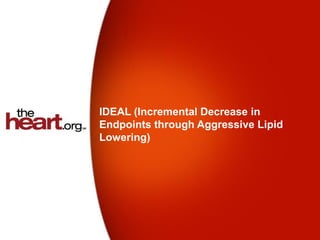IDEAL trial - Summary & Results
- 1. IDEAL (Incremental Decrease in Endpoints through Aggressive Lipid Lowering)
- 2. IDEAL (Incremental Decrease in Endpoints through Aggressive Lipid Lowering) T Pedersen (Ullev?l University Hospital, Oslo, Norway) American Heart Association 2005 Scientific Sessions ? Background: IDEAL is a "lower-is-better" investigation comparing high-dose atorvastatin (80 mg) with simvastatin 20 mg, a dose widely used in clinical practice ? A prospective, randomized, open-label, blinded-end-point evaluation trial ? Population: 8888 patients aged 80 years or younger with a history of acute MI ? Primary outcome: Composite of coronary death, nonfatal MI, or cardiac arrest with resuscitation
- 3. IDEAL: Results ? At a five-year follow-up mean LDL-C was 80.0 mg/dL in atorvastatin patients and 99.8 mg/dL in simvastatin patients ? There was no statistical difference in the incidence of the primary end point between the two arms Primary outcomea Outcome (%) Simvastatin (n=4449) Atorvastatin (n=4439) Hazard ratio (95% CI) Major coronary eventb 10.4 9.3 0.89 (0.78©C1.01) CHD death 4.0 3.9 0.99 (0.80©C1.22) Nonfatal MI 7.2 6.0 0.83 (0.71©C0.98) Cardiac arrest with resuscitation 0.2 0.2 NA a. At a median of 4.8 years b. Coronary death, nonfatal MI, or cardiac arrest with resuscitation
- 4. IDEAL: Results ? The composite secondary end point of a major CV eventa was significantly reduced in patients treated with atorvastatin Secondary outcomesb Outcome (%) Simvastatin (n=4449) Atorvastatin (n=4439) Hazard ratio (95% CI) Any CHD event 23.8 20.2 0.84 (0.76©C0.91) Coronary revascularization 16.7 13.0 0.77 (0.69©C0.86) Hospitalization for unstable angina 5.3 4.4 0.83 (0.69©C1.01) Fatal or nonfatal stroke 3.9 3.4 0.87 (0.70©C1.08) Major CV event 13.7 12.0 0.87 (0.78©C0.98) Any CV event 30.8 26.5 0.84 (0.78©C0.91) a. Major coronary events and stroke b. At a median of 4.8 years
- 5. IDEAL: Commentary* "Nothing magical seems to happen here that would make us shift our focus away from LDL-lowering effects. The important point is to lower LDL cholesterol to sufficiently low levels to provide incremental benefit." - Dr James de Lemos "Saying that it is difficult is not saying that we shouldn't try. . . . What the guidelines are really telling clinicians is to get the LDL cholesterol down as low as you safely can." - Dr Steven Nissen *All comments from IDEAL: Intensive lipid lowering after acute MI did not reduce the risk of major coronary events (http://www.theheart.org/article/598723.do)
- 6. Become a member of http://www.theheart.org Become a fan on Facebook: http://www.facebook.com/theheartorg Follow us on Twitter: http://www.twitter.com/theheartorg theheart.org is the leading online source of independent cardiology news. We are the top provider of news and opinions for over 100 000 physicians.






